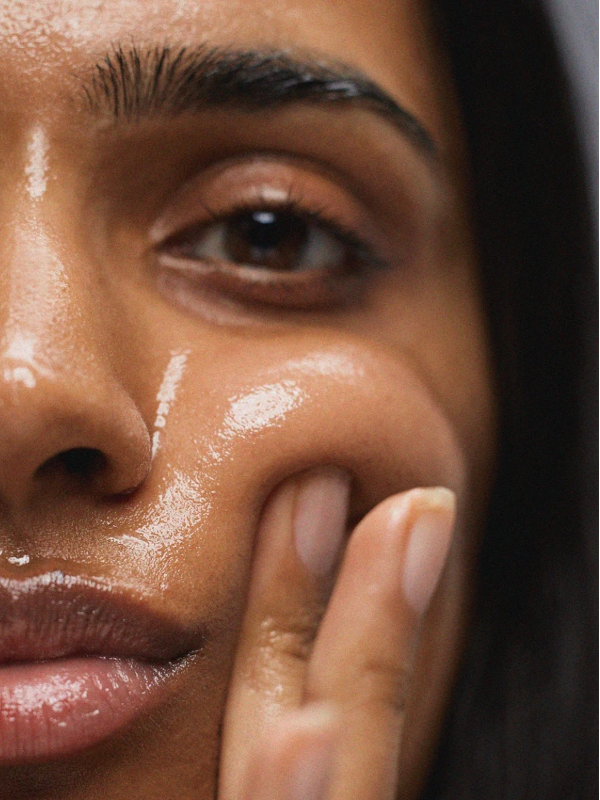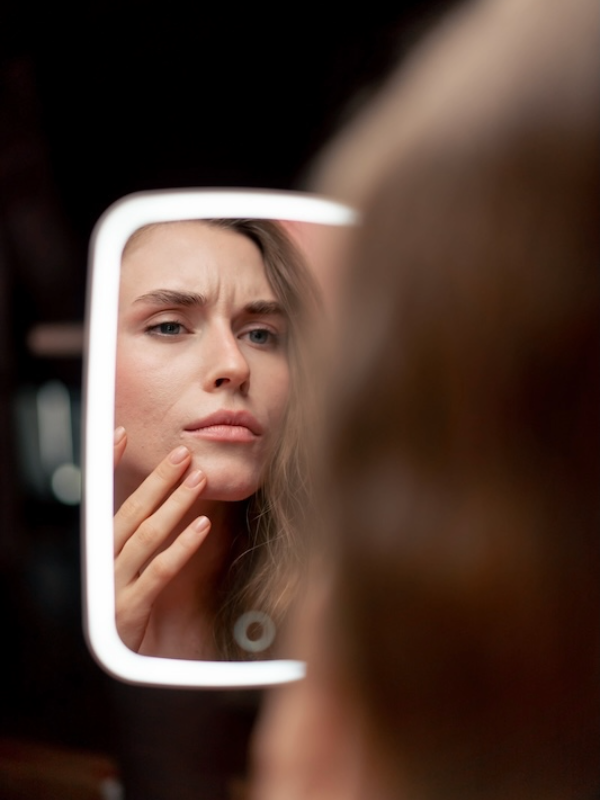Why Over-Exfoliating Is Hurting Your Skin: Advice from a Salon Owner with 20 Years of Experience
After 20 years of running my own salon and working closely with clients, I’ve seen a lot when it comes to skincare—both the good and the bad. One of the most common mistakes I see, time and time again, is over-exfoliating. I know it’s tempting to want to scrub away imperfections, hoping for smoother, clearer skin, but trust me, more exfoliation does not mean better skin. In fact, over-exfoliating is one of the quickest ways to damage your skin.
In all my years of experience, I’ve seen firsthand how this skincare trend can leave your skin irritated, dry, and prone to breakouts. If you’ve been exfoliating too much, or using the wrong products, I’m here to tell you to slow down—your skin will thank you for it. Here’s what you need to know.
What Is Exfoliation and Why Can It Be Harmful?
Exfoliation is important because it helps remove dead skin cells from the surface of your skin, leaving it feeling fresh and smooth. It can be done through physical exfoliants, like scrubs, or chemical exfoliants, like acids. When done correctly and in moderation, exfoliation has real benefits. But when you do it too often or too aggressively, it strips away your skin’s natural barrier, causing damage that can be hard to reverse.
I’ve worked with clients who thought exfoliating daily would give them that “glow” everyone talks about, only to end up with sensitive, inflamed skin that takes months to heal. It’s so important to exfoliate mindfully—less is often more.
The Risks of Over-Exfoliating
1. You’re Damaging Your Skin’s Barrier
Your skin’s outer layer acts as a barrier to protect you from environmental pollutants, bacteria, and moisture loss. When you over-exfoliate, you’re stripping away that barrier. This leaves your skin vulnerable, making it more prone to irritation, sensitivity, and infection.
I’ve had clients come to me with red, raw skin from scrubbing too hard or using harsh products too frequently. It breaks my heart to see, especially because the damage could have been avoided. Trust me—if you’re scrubbing your skin every day, it’s time to stop.
2. Your Skin Becomes More Sensitive
I know it feels satisfying to scrub your skin clean, but over-exfoliating can make your skin overly sensitive to everything—your cleanser, your moisturiser, even water. I’ve seen clients who can no longer tolerate products they’ve used for years because they’ve damaged their skin’s protective layer.
If your skin starts to sting or burn when applying skincare products, it’s a sign you’ve overdone it. Sensitivity is your skin’s way of telling you to back off.
3. It Can Lead to Dryness
Here’s where things get confusing—people often think exfoliation will help with dry, flaky skin, but over-exfoliating actually makes dryness worse. By stripping your skin of its natural oils, you leave it dehydrated, and your skin will often respond by producing even more oil to compensate. This leaves you in a vicious cycle of dryness and oiliness that’s hard to break.
4. You Can Trigger Breakouts
One of the most surprising things I see is when people come in with acne that’s worsened by over-exfoliating. They think scrubbing will clean out their pores, but in reality, too much exfoliation inflames the skin, causes breakouts, and clogs pores even more.
I’ve had clients with oily or acne-prone skin who were exfoliating daily and wondering why their acne wasn’t improving. Once they slowed down their exfoliation and focused on soothing and healing the skin, they saw real improvement.
5. It Can Cause Hyperpigmentation
Over-exfoliating can also cause hyperpigmentation, especially in darker skin tones. Scrubbing or using harsh acids can trigger inflammation, leading to dark spots and uneven skin tone. This is something I’ve seen often in clients who thought more exfoliation would help even out their complexion, only to end up with worse pigmentation issues.
How to Tell If You’re Over-Exfoliating
It’s easy to get carried away with exfoliation, but there are a few clear signs that you’re overdoing it. If you notice any of these, it’s time to pull back:
• Redness or irritation that doesn’t go away
• Dry, flaky patches that feel tight and uncomfortable
• Products that used to feel fine now cause stinging or burning
• Breakouts or bumps appearing more frequently after you exfoliate
• Your skin feels tight or raw
If you’re experiencing any of these symptoms, stop exfoliating for a week or two and give your skin time to heal.
How often should you exfoliate?
Well, it depends on your age and skin condition:
- Under 12 Years Old
Not recomended at all (unless prescribed for specific skin conditions (e.g., keratosis pilaris). Children's skin barrier is very delicate, their sebum production is very low. Very minimal hormonal changes at prepubescent stage. Use gentle cleanser, toner, SPF and moisturisers only
-Teens (13-19 Years Old)
Using gentle chemical exfoliants, such as BHA (salicylic acid), 2–3 times per week is ideal for teenage skin. During adolescence, increased androgen levels trigger higher sebum production, which can lead to clogged pores and acne. A teen's skin typically renews every 21–28 days, but if dead skin cells aren’t shed properly, they can accumulate and block pores—contributing to blackheads, whiteheads, and inflamed breakouts.
-Young adults (20-35 Years Old)
Sebum production remains moderate to high, which means acne and premenstrual breakouts are still common in this age group. Skin cell turnover begins to slow slightly, with the cycle averaging around 28 days. If dead skin cells aren’t shed effectively, they can build up and lead to dullness, congestion, and breakouts.
We recommend using chemical exfoliants—like BHA (salicylic acid) or AHA (glycolic/lactic acid)—2 to 3 times per week, adjusting the frequency based on your skin’s sensitivity.
-Pre-mature (35-45 Years Old):
Sebum production begins to gradually decline in your 30s, and skin cell turnover slows to approximately 30–35 days. This slower renewal process can lead to dullness, fine lines, and uneven skin tone.
To support healthy skin function, gentle exfoliation 1–2 times per week is recommended. AHAs (like glycolic or lactic acid) or enzymatic exfoliants help to brighten the complexion, smooth texture, and promote more even tone—without over-stripping the skin.
-Mature (45-55 Years Old):
As estrogen levels begin to drop during perimenopause, sebum production decreases, leading to drier, more delicate skin. By age 50 and beyond, the skin’s natural cell turnover can slow significantly—up to 50–90 days—resulting in a duller complexion and uneven texture.
To support skin health without compromising its fragile barrier, exfoliation should be approached with care.
Limit exfoliation to every 10–14 days using mild PHAs (polyhydroxy acids) or gentle AHAs like lactic acid.
Over-exfoliating at this stage can increase dryness and lead to barrier damage.
What Not to Do
1. Don't Use Harsh Physical Scrubs
Scrubs with large, jagged particles—like those made with walnut shells or apricot kernels—can cause micro-tears in your skin, leading to long-term damage. These scrubs are far too rough for your face, so skip them altogether.
2. Don’t Layer Exfoliating Products
I’ve seen clients use an exfoliating cleanser, followed by an exfoliating toner, and then an exfoliating serum—all in one routine. That’s way too much. Stick to one exfoliating product at a time to avoid overwhelming your skin.
3. Don’t Exfoliate Active Breakouts
If you’ve got active acne, resist the urge to scrub it away. Exfoliating active breakouts can spread bacteria and cause more inflammation. Focus on soothing and healing the skin instead.
Final Thoughts
I’ve spent two decades helping clients improve their skin, and one thing I’ve learned is that less is more when it comes to exfoliation. Over-exfoliating can lead to a world of skin problems that are hard to fix. The key is finding balance—giving your skin the gentle care it needs, rather than attacking it with scrubs and acids.
At Skinportant Clinic in Southsea, we’re here to help you make the right choices for your skin. If you’re unsure how often to exfoliate or what products to use, come in for a consultation. I’ll work with you to create a routine that suits your skin, so you can enjoy a healthy, glowing complexion—without any of the damage.


.jpeg)


